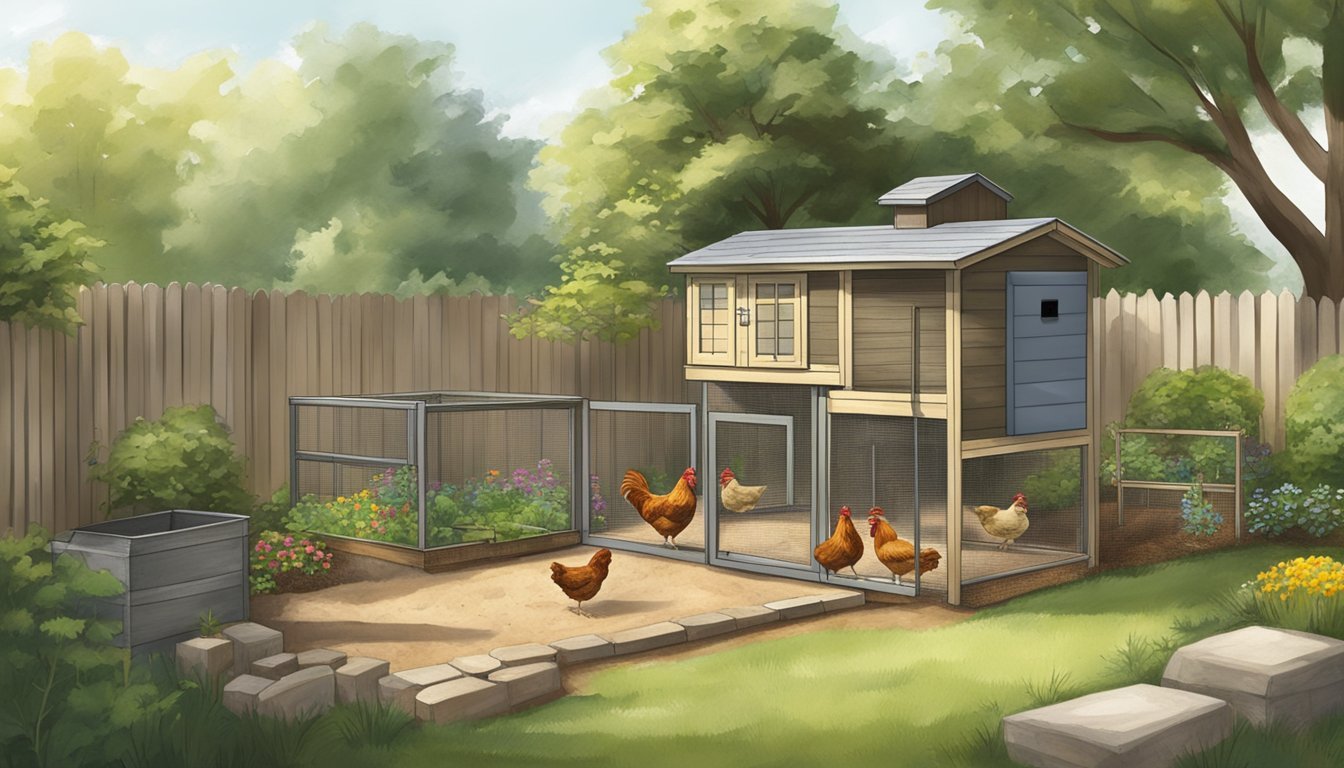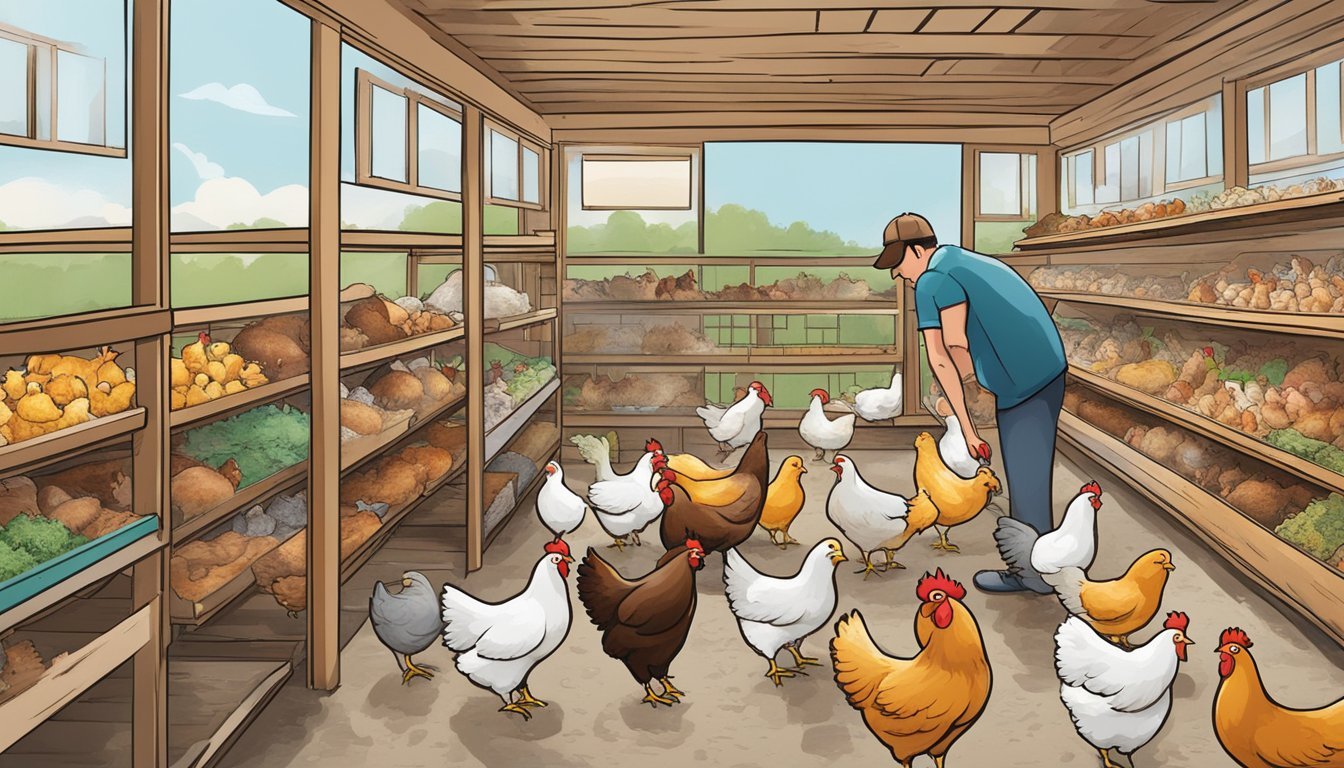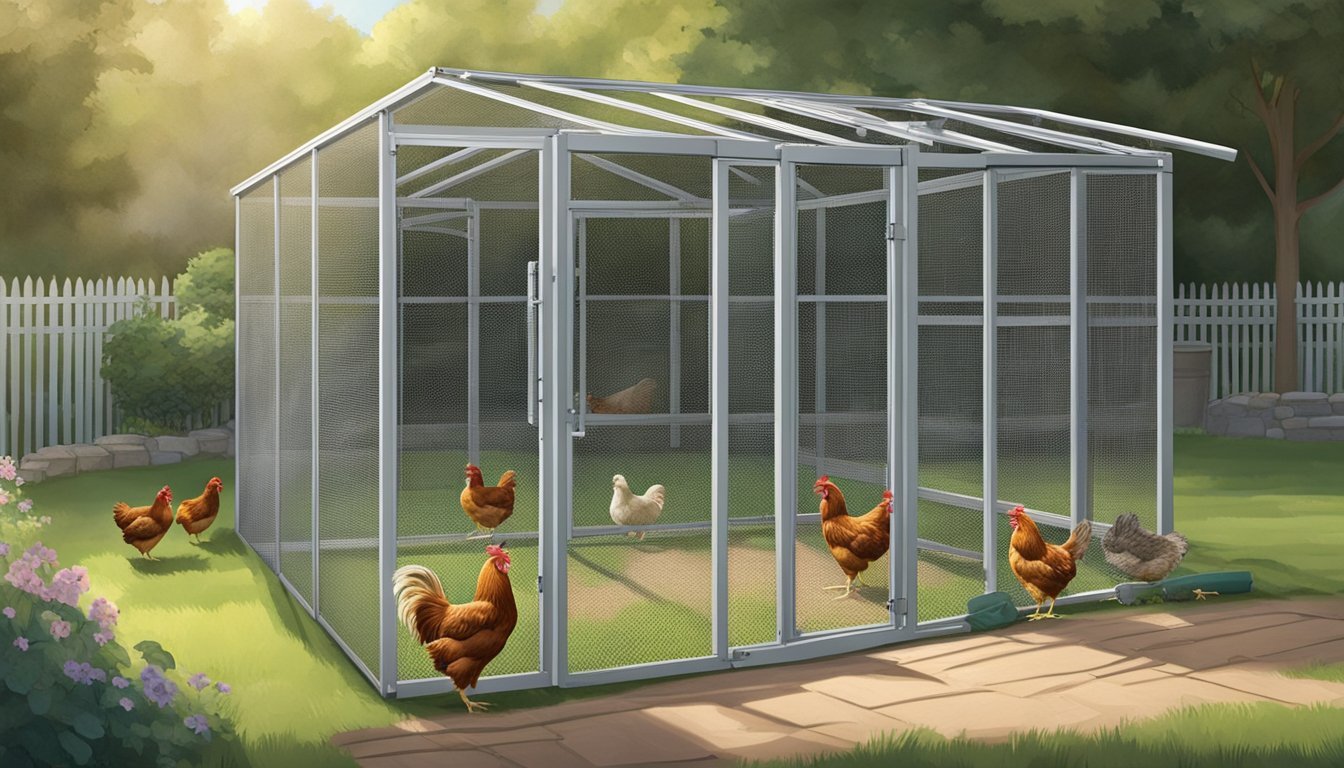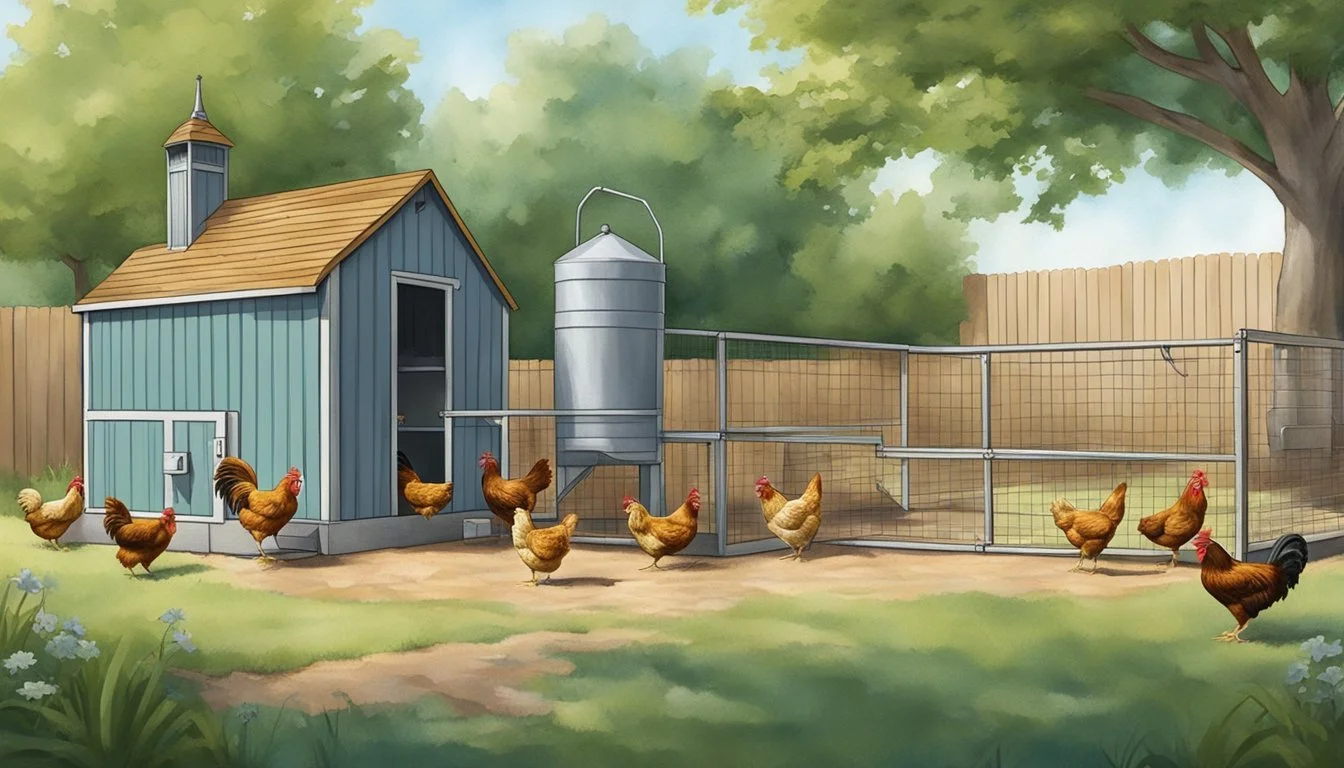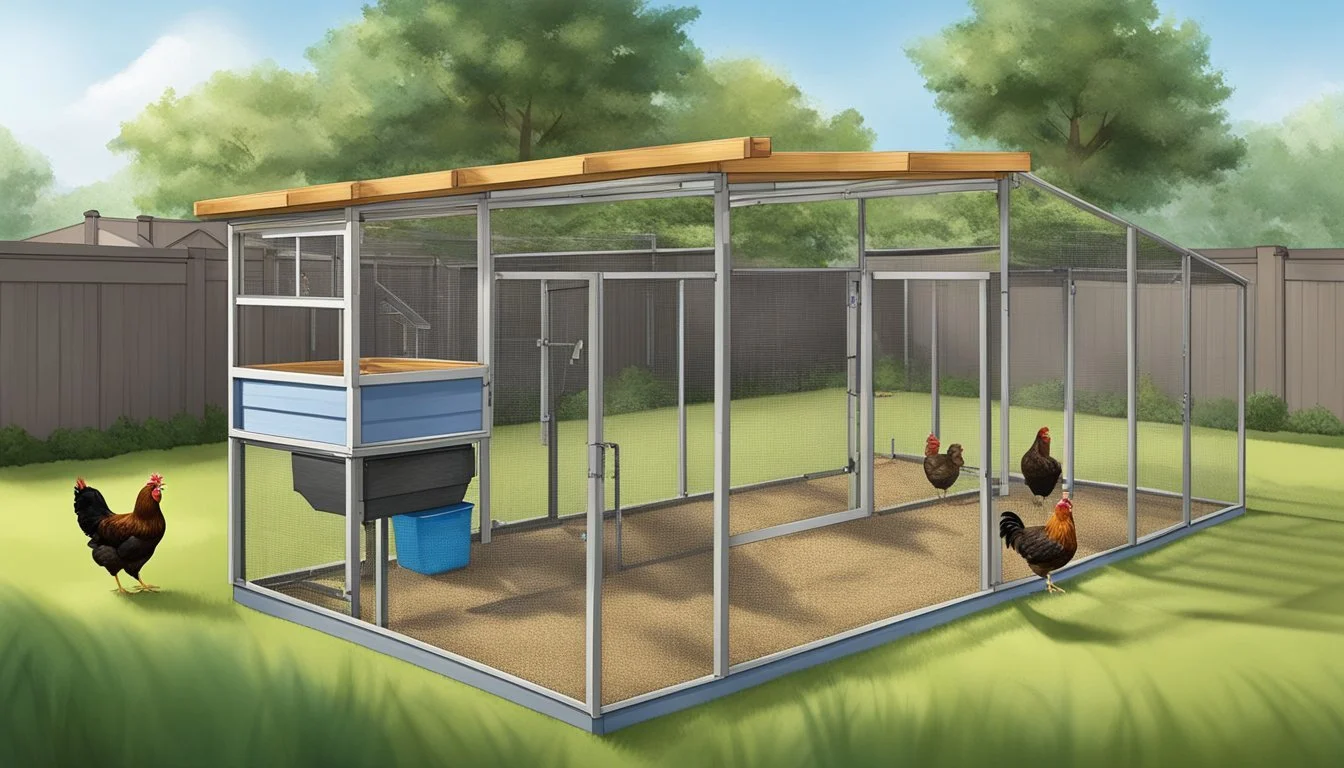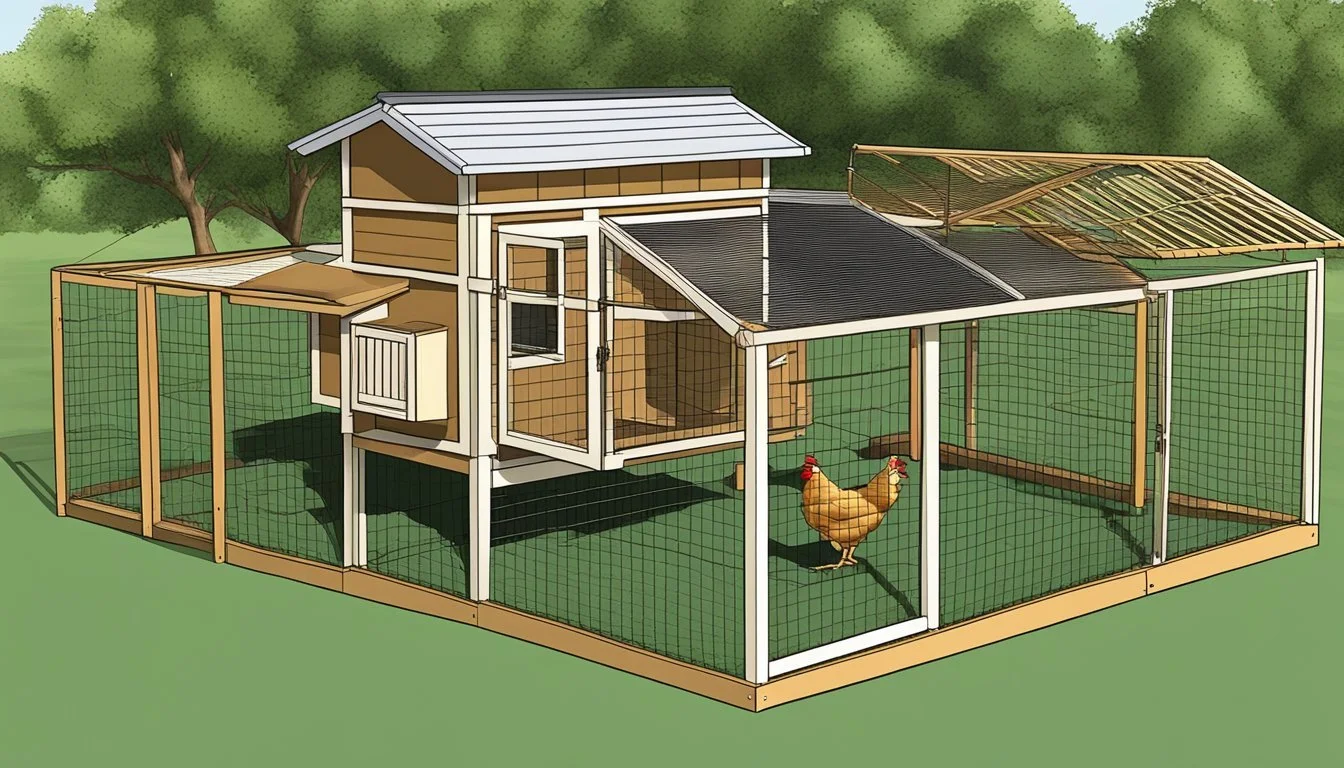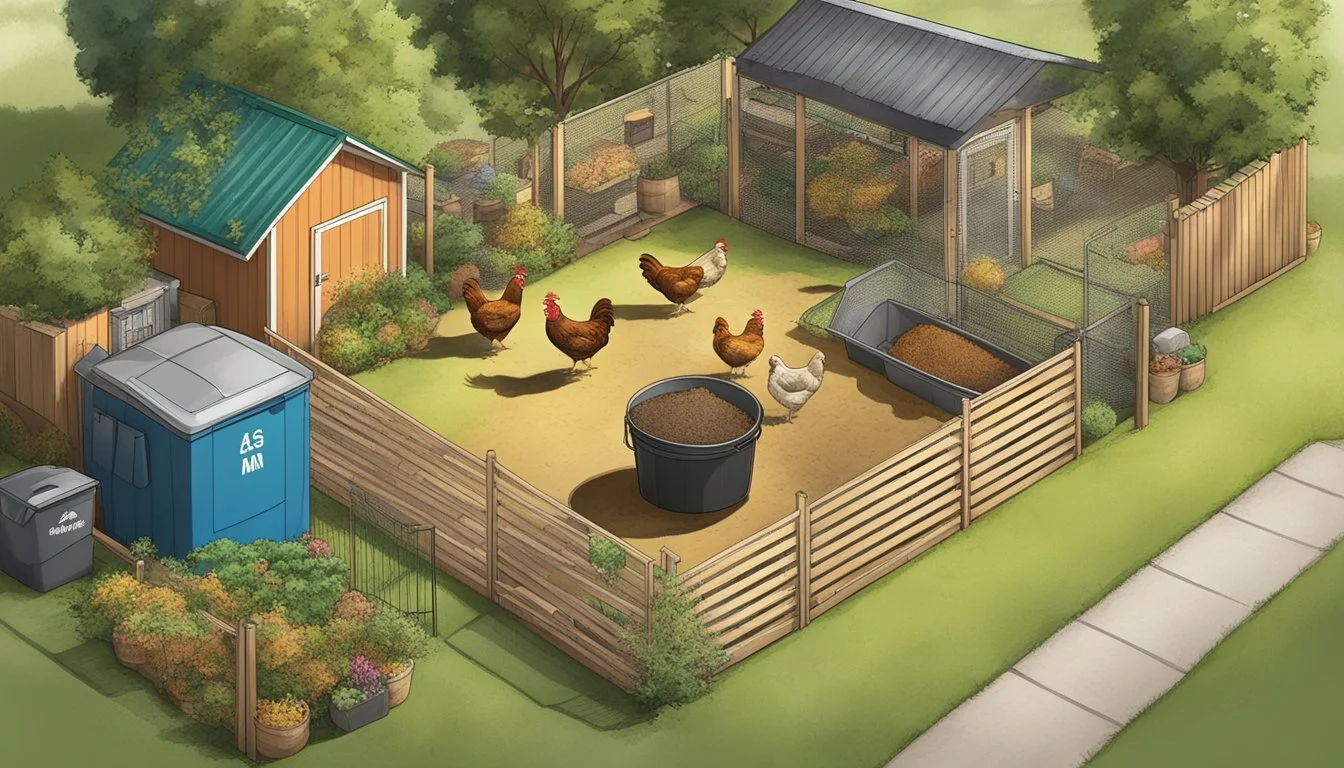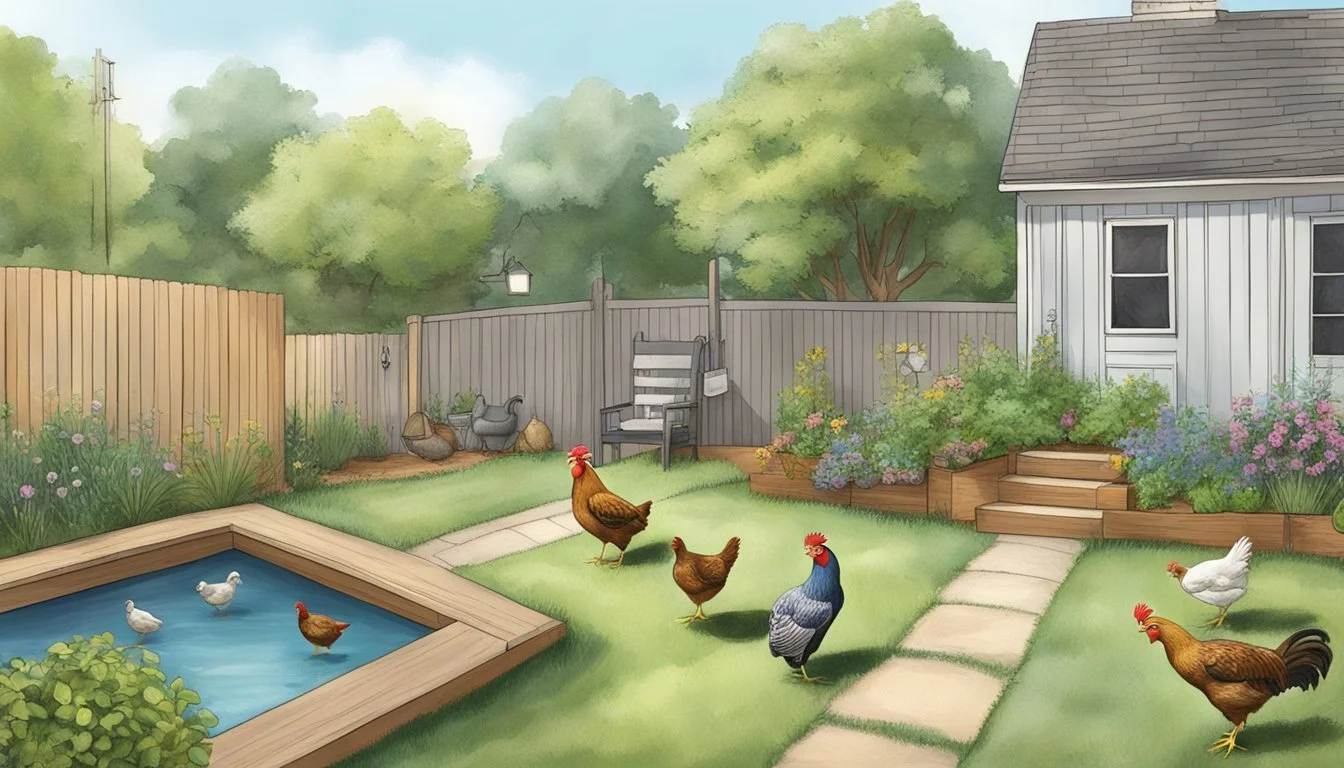Keeping Backyard Chickens in Arlington, TX
Essential Guidelines for Local Poultry Enthusiasts
Residents of Arlington, Texas, have the opportunity to embrace the sustainable practice of keeping backyard chickens (how long does chicken last?), aligning with a growing movement of urban agriculture. Local regulations in Arlington allow for a personal connection to food sources and a chance to enjoy the pleasures of raising poultry, subject to certain rules that promote the well-being of both the chickens and the community.
Individuals living on half an acre can maintain up to four chickens, while those with more space can keep more; ten chickens are allowed on lots between half an acre and one acre, and twenty-five for properties exceeding an acre. However, while chickens are permitted, the keeping of roosters is prohibited to minimize noise disturbances. The city has established clear coop restrictions to ensure chickens are safely contained in a manner that protects them and keeps the area clean.
These regulations ensure that although residents can enjoy the benefits of fresh eggs and the joys of poultry husbandry, considerations are in place to address sanitation and animal welfare. Chickens must be kept within a coop or pen, fostering a safe and healthy environment for the birds, which also minimizes any potential nuisance for neighbors. This balance of interests reflects Arlington's commitment to promoting responsible urban farming practices within its community.
Understanding Local Chicken Laws in Arlington
Residents of Arlington, Texas, considering raising backyard chickens must first familiarize themselves with the city's specific ordinances to comply with local laws. The City of Arlington has precise requirements for keeping chickens that are designed to maintain community standards and animal welfare.
Firstly, it's critical to check for updates on Arlington's local chicken laws, as these regulations can evolve. For accurate information, contacting city officials or visiting the city's official website is advisable.
The key points of the ordinance include:
Permit Requirements: Residents may need to obtain a permit before keeping chickens. Check with city ordinances to determine if a permit is necessary and to understand the associated process.
Space Restrictions: Chicken pens must be placed at a minimum distance from habitations. As per the latest known rules, the enclosure should be 50 feet from any dwelling.
Number of Chickens: Ordinances might dictate the maximum number of chickens allowed. The city may also differentiate between hen and rooster ownership, often with more restrictive rules on roosters due to noise considerations.
Sanitation: To maintain sanitary conditions, the penned area must adhere to specific cleanliness standards to prevent odors and attractants for pests.
Noise: Complaints about noise, such as that from crowing roosters, can result in action from local authorities.
Non-compliance with these laws can lead to fines or penalties. It is imperative that potential chicken owners in Arlington familiarize themselves with both the current local ordinances and city codes related to keeping backyard chickens to ensure they are following all relevant guidelines.
Deciding If Backyard Chickens Are Right for You
When considering backyard chickens in Arlington, TX, potential keepers should think critically about the pros and cons related to raising chickens. Raising chickens offers the benefits of eggs, insect control, and a unique companionship akin to traditional pets. Self-sufficiency is an appealing aspect, as families can produce their own fresh eggs.
However, they must also account for the time, resources, and experience required. Chickens are social creatures and need proper care. Before committing, evaluators must consider three key criteria:
Local Regulations: Many areas have specific ordinances regarding the keeping of livestock within city limits. Residents should verify Arlington's regulations on coop construction, noise, and the number of animals allowed.
Space Requirements: Chickens require adequate space not only for the coop but also for roaming. A general guideline for space is 4-5 square feet per chicken inside the coop and 10 square feet in an outdoor run.
Time Commitment: They should weigh the daily commitment, including feeding, clean water provision, coop cleaning, and health checks.
Resources and Costs:
Initial setup for coops and runs can be costly
Ongoing expenses include feed, bedding material, and veterinary care
Prospective owners must appraise not only the charm of raising chickens but also the practical side of it, approaching their decision with a clear, neutral sense of the work and benefits involved.
Selecting and Acquiring Your Chickens
When starting a flock of backyard chickens in Arlington, TX, individuals need to consider local ordinances as well as the practical aspects of keeping poultry. Arlington city regulations permit up to four chickens on properties that are half an acre or smaller. Prospective owners should note that roosters are not allowed, reducing potential noise complaints.
Selection of Chickens: In selecting the right chickens, one should consider the breed's adaptability to Texas' climate. Heritage breeds and those bred for heat tolerance often fare well. Pullets (young hens) are a popular choice for beginners wanting to skip the chick-raising stage.
Sources for Chickens:
Local hatcheries: Offer a wide variety of breeds, and one can discuss specific needs with professionals.
Farm supply stores: Often stock chicks, especially in the spring.
Agricultural fairs: Connect with local breeders for high-quality birds.
Online: Several reputable websites allow one to order chickens, which are then delivered as chicks by mail.
Key Considerations:
Space: Provide ample space in a secure coop or pen to protect from predators.
Health: Source chickens from reputable suppliers to ensure they are disease-free.
Community: Consider the impact on neighbors and ensure adherence to the fifty-foot distance requirement from other habitations.
Before purchasing, one should verify the latest Arlington regulations to ensure compliance. Acquiring chickens responsibly and ethically is crucial for the well-being of the fowl and satisfaction of the owner.
Designing and Building a Secure Coop
When constructing a chicken coop in Arlington, TX, one must prioritize security against predators. A sturdy coop not only shelters chickens but also deters various wildlife that could pose a threat, such as raccoons and foxes.
Essential Elements for Coop Security:
Walls and Doors: The coop must have solid walls without gaps. All access points, including doors and windows, should feature secure latches. Raccoons, known for their dexterity, can open simple locks, hence heavy-duty latches are recommended.
Fencing: The perimeter around the coop should be enclosed with predator-proof fencing rather than just chicken wire, which is mainly to contain chickens rather than protect them. The fencing needs to extend underground to prevent digging predators.
Coop Elevation: Elevating the coop several inches off the ground can thwart some ground predators and provides an additional layer of protection.
Material Purpose Characteristics Heavy-duty latches Secure doors/windows Must be raccoon-proof Predator-proof fencing Protect perimeter Durable, extends underground Hardware cloth Underneath coop and for windows Smaller mesh than chicken wire
Builders should ensure the coop offers adequate space for exercise and ventilation, while maintaining security. Cleanliness is critical to prevent disease, and the structure should be kept free from waste buildup.
By combining these elements, one can create a safe habitat where chickens can live and thrive, protected from common threats in the Arlington area.
Feeding and Watering Your Flock
When raising backyard chickens in Arlington, TX, owners must ensure that their chickens have access to clean water and a balanced diet consistently. Here are the essentials for proper feeding and watering:
Food: Chickens require a nutritionally complete diet to stay healthy and, if they are layers, to produce eggs. A commercial chicken feed, which is specially formulated for different stages of their life, from starter to layer feed, provides a balanced diet for them.
Starter Feed: High in protein, it helps chicks grow during their first weeks of life.
Layer Feed: Contains calcium, necessary for laying chickens to produce strong eggshells.
It's important to allot about 50 pounds of quality chicken feed per month for a flock of six hens.
Water: Chickens should always have access to fresh water. Water intake is pivotal to a chicken's health and the egg production process.
Waterers: Must be kept clean and filled, especially during extreme temperatures.
Placement: Waterers should be placed in a shaded area during the summer to keep the water cool.
In Arlington, residents should be aware that feeding and watering their flock adequately not only contributes to the birds' wellbeing but also complies with local ordinances aiming to keep pets and residential livestock in good health.
Ensuring Health and Safety for Your Chickens
When maintaining a flock of backyard chickens in Arlington, TX, the health and safety of the poultry are paramount. Adhering to local regulations is the first step in ensuring that chicken-keeping practices meet community standards and prevent the spread of disease.
Preventing Disease: It's crucial to maintain sanitary conditions in the coop and surrounding area. Regular cleaning, including the removal of waste and soiled bedding, helps prevent the buildup of harmful bacteria. For the health of both chickens and their keepers, hand washing after handling chickens or any items in their living space is essential.
Protection from Predators: Arlington residents must secure their chickens against local predators such as raccoons, foxes, and birds of prey. Utilizing sturdy materials for the coop and fencing, and ensuring that there are no gaps or weak spots, can protect the flock.
Adequate Exercise: Chickens need space to roam and exhibit natural behaviors. Encouraging exercise helps maintain their physical health and reduces stress, which can lead to better egg production and decreased aggression among birds.
Local Regulations: They should investigate any specific local ordinances that may dictate coop construction, distance from other properties, and the number of animals allowed.
By integrating these elements into chicken care routines, owners can foster a thriving and healthy backyard flock. Following these actionable steps will enable keepers to provide a conducive environment for their chickens' well-being:
Sanitation: Clean coop regularly; provide fresh water and food daily.
Safety: Secure the coop from predators; keep a watchful eye for signs of distress.
Exercise: Ensure ample space is available for chickens to move and forage.
Compliance: Stay informed on Arlington's city ordinances regarding backyard poultry.
Complying With Lot Size and Number Restrictions
In Arlington, Texas, residents interested in raising chickens on their property must adhere to specific regulations based on the size of their lot. It's essential to review and understand these restrictions to ensure compliance with local ordinances.
For properties under half an acre, individuals are allowed to keep a maximum of four chickens. When the property size is over half an acre but less than one acre, the limitation increases to ten chickens. Property owners with more than one acre can have up to twenty-five chickens. Notably, roosters are not permitted, limiting noise concerns within residential areas.
Lot Size Max Number of Chickens Up to 1/2 Acre 4 More than 1/2 Acre to 1 Acre 10 More than 1 Acre 25
Chicken coops or pens are mandatory for keeping chickens contained. They must be well-maintained to avoid attracting pests and to ensure the health and well-being of the chickens. Providing at least 4 square feet per chicken in the coop or henhouse will meet the space requirements as laid out by the City of Arlington.
Residents must also consider the rules set by Homeowners Associations (HOAs), as they may have stricter regulations or even prohibitions on keeping chickens, regardless of city ordinances. HOA bylaws can overrule local laws allowing chicken keeping, thus property owners should check their HOA covenants.
By following these local ordinances and association rules, Arlington residents can raise backyard chickens legally and responsibly.
Understanding Noise and Waste Management Obligations
In Arlington, TX, residents who keep backyard chickens must adhere to specific regulations to manage noise and waste, ensuring that their activities remain sanitary and do not disturb neighbors.
Noise Ordinance: Residents must comply with the local noise ordinance, which includes restrictions on loud sounds, especially during nighttime hours. It is important for chicken owners to:
Monitor their flock, particularly roosters, since they crow at dawn and can be a source of noise complaints.
Consider installing soundproofing measures for coops if close to neighboring properties.
Waste Management: Arlington mandates the proper handling of chicken waste to maintain a sanitary environment. Owners should:
Regularly clean coops to prevent odor buildup.
Compost chicken manure appropriately, which can be beneficial for gardens if done correctly.
Ensure waste does not contaminate water sources or encroach on neighbor's property.
Obligations Description Benefit Noise Control Keep noise levels in accordance with local rules, especially concerning rooster crowing. Reduced disturbances Waste Disposal Implement a consistent cleaning and composting schedule for chicken waste. Environmental health Sanitary Coops Maintain cleanliness to prevent pests and diseases. Animal well-being
Adhering to these obligations allows for responsible and neighborly urban farming practices in Arlington.
Dealing With Potential Fines and Penalties for Non-Compliance
In Arlington, TX, individuals must adhere to local ordinances regarding the keeping of backyard chickens to avoid fines and penalties. These regulations are in place to ensure community standards and public health are maintained.
Fines: Non-compliance with chicken-keeping laws may lead to monetary penalties. The fine amount varies depending on the nature and frequency of the offense.
Penalties: Repeated offenses can escalate the situation, potentially leading to more severe consequences beyond financial fines. This might include mandatory removal of the chickens or other legal actions.
Ordinance Compliance: Residents should review Arlington's specific ordinances related to backyard chickens. Key factors often regulated include the number of chickens allowed, coop placement, and maintenance standards. It's crucial to obtain any required permits before starting a backyard flock.
Avoiding Offenses: To prevent any legal issues, residents can take the following steps:
Research Local Laws: Contact local authorities or review municipality documents to understand all applicable chicken-keeping laws.
Stay Informed: Keep abreast of any changes in regulations to ensure ongoing compliance.
Engage in Best Practices: Maintain a clean and orderly coop. Manage noise and waste to avoid complaints from neighbors.
In the event of a purported violation, individuals may receive a warning or notice to correct the issue. Continuous failure to comply may result in legal proceedings, where individuals can present their case and any mitigating factors. It is advisable to address any potential violations promptly to avoid escalation.
Exploring the Broader Context of Chicken Keeping in Texas
In Texas, the practice of keeping backyard chickens has become prevalent, given the state's encouragement for self-sufficiency. The laws governing the keeping of chickens, however, vary significantly across cities.
For instance, cities like Austin are known for their progressive stance on urban agriculture, allowing residents to keep backyard chickens with specific but manageable restrictions. San Antonio and Dallas emulate this model, having developed clear ordinances permitting residential chicken rearing.
In contrast, cities such as Irving and Laredo impose stringent rules, pointing towards the complex tapestry of ordinances within the state. Regulations often cover aspects like the distance a chicken coop must be from a neighbor's dwelling and the maximum number of chickens allowed without a permit.
City Notable Ordinance Highlights Houston Permits required for more than 30 chickens. Fort Worth Up to 6 hens allowed, no roosters; permits for more. El Paso Number restrictions and coop regulations apply. Plano Allowance varies by lot size; generally quite permissive.
Cities such as Grand Prairie and Waco have historically had more restrictive policies but have become more permissive in recent years, recognizing the benefits of urban poultry.
The emergence of the pandemic underscored this trend, with cities like Round Rock and Richardson noting an increase in residents seeking to raise chickens. This suggests a broader cultural shift towards sustainability and food autonomy in the urban settings of Texas.
In summary, whether enthusiasts reside in Lewisville, Corpus Christi, Garland, Carrollton, or beyond, it’s vital to consult local ordinances before starting a backyard flock to ensure compliance with city-specific requirements.
Future Considerations and Keeping Updated on Ordinances
When maintaining backyard chickens in Arlington, TX, it is crucial for residents to stay abreast of the latest city ordinances to ensure compliance. Ordinances can evolve based on various factors including public health concerns, animal welfare, and community feedback.
Ordinance Updates:
Arlington, TX: The most recent information suggests the city requires all chickens to be kept in secure, sanitary pens at least 50 feet from the nearest habitation.
State Legislation: Texas laws may affect local ordinances, so monitoring any state bills related to poultry is advisable.
Neighboring Cities: Practices in nearby Austin and Houston can influence changes in Arlington's regulations.
How to Stay Informed:
City Government Website: Arlington’s official website is a reliable source for the latest ordinance updates.
City Council Meetings: Attending meetings can provide insight into potential changes.
Local Community Groups: Engaging with community groups or forums can help poultry owners exchange information and stay informed.
Regular Review: Marking a quarterly review of the laws can prevent non-compliance.
Residents should be proactive in consulting with the city's animal services department or legal experts for clarification on existing laws. Though the last known update was on November 19, 2023, owners should regularly confirm if any new updates have been implemented. By remaining informed, chicken owners in Arlington can responsibly enjoy the benefits of urban poultry while adhering to municipal requirements.



